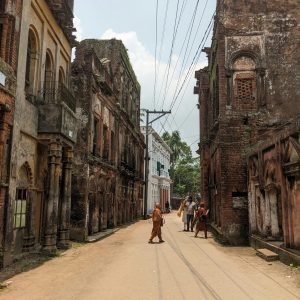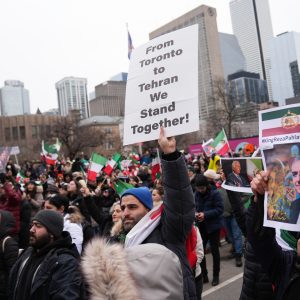End of an era: Bangladeshi premier resigns and flees to India amid unrest, army takes charge
Leaders of the Students Against Discrimination, Mohammed Nahid Islam and Asif Mahmud, issued a joint statement on Facebook, calling for the establishment of a new political order
By MNTV Desk
DHAKA, Bangladesh (MNTV) – Bangladesh has been thrown into political turmoil as Prime Minister Sheikh Hasina resigned after 15 years in power, marking the end of the longest tenure in the country’s history.
The announcement was made by General Waker-Uz-Zaman, the Chief of Army Staff, who declared the establishment of an interim government to oversee the nation until fresh elections can be organized.
This political shift follows weeks of intense anti-government protests, initially sparked by discontent over a controversial job quota system and escalating into a broader movement against governmental oppression.
The protests resulted in the deaths of over 300 people, making it one of the deadliest periods in Bangladesh’s recent history.
The protests began as a response to the 30% job quota system favoring relatives of those who fought in Bangladesh’s War of Independence in 1971.
This system was perceived as unfair and discriminatory, leading to widespread outrage among students and young professionals. The movement rapidly gained momentum, with thousands of protesters taking to the streets, demanding Hasina’s resignation.
Sunday, one of the bloodiest days in the nation’s history, saw 98 fatalities as protesters clashed with police across the country.
The capital, Dhaka, and northern districts like Bogura, Pabna, and Rangpur, along with western Magura, eastern Comilla, and southern Barisal and Feni, were engulfed in violence. The unrest prompted a nationwide curfew and tight restrictions on mobile internet. The government declared a three-day holiday to ensure safety.
The Army steps in
In a televised address, General Zaman urged for calm and promised to restore peace and prepare for a democratic transition. He emphasized the army’s commitment to justice for the victims of recent violence, reassuring the public of their safety and the interim government’s intent to meet their demands.
“There is a crisis in the country. I have met opposition leaders, and we have decided to form an interim government to run this country. I take all responsibility and promise to protect your life and property. Your demands will be fulfilled. Please support us and stop the violence,” he said.
Despite the military’s intervention, the opposition, led by the Students Against Discrimination, has rejected the notion of military rule.
They assert that the future governance of Bangladesh should be determined by the populace who “brought the revolution.” This sets the stage for a potentially complex power transition, as the demand for a civilian-led administration remains strong.
A nation celebrates
As news of Hasina’s resignation spread, thousands of people took to the streets in celebration, with some storming the Prime Minister’s official residence.
The joyous scenes were a stark contrast to the violence that had gripped the nation.
Protesters chanted slogans and waved banners, celebrating what they see as a new beginning for Bangladesh.
The unrest has significantly impacted various sectors, notably the garment industry, with numerous factories closed indefinitely. The garment sector, a crucial part of Bangladesh’s economy, faces severe disruptions as the nation grapples with political instability.
A new political order
Leaders of the Students Against Discrimination, Mohammed Nahid Islam and Asif Mahmud, issued a joint statement on Facebook, calling for the establishment of a new political order.
They demanded that power be handed over to the “revolutionary students and citizens,” stating that any other scenario would “not be accepted.”
“The fascists and murderers will be brought to justice on the soil of Bengal; no one will be given the chance to escape,” they declared. They also demanded the release of political prisoners and those who have been forcibly disappeared.
The students’ group has played a pivotal role in the protests, organizing massive rallies and mobilizing support across the nation.
Their demands resonate with a broad spectrum of society, including celebrities and various social sectors, highlighting the widespread desire for political change.
Hasina flees to India
Local media in India reported that an aircraft carrying the former Prime Minister of Bangladesh landed at Indian Air Force Hindon Air Base near New Delhi.
Hasina was on board a Bangladesh Air Force aircraft, accompanied by her younger sister, Sheikh Rehana. It is expected that Hasina will leave for London shortly.
She is reported to have met India’s National Security Advisor Ajit Doval at the airport.
The visuals of protesters vandalizing a statue of Sheikh Mujibur Rahman, Hasina’s father and a revered figure in Bangladesh’s history, mark a significant shift in the country’s political landscape.
Mujibur Rahman, known as Bangabandhu, is a symbol of Bangladesh’s fight for independence from Pakistan. However, for many protesters, his legacy has been tainted by his daughter’s governance.
Escalating Violence
The protesters’ anger reached a boiling point following a controversial remark by Prime Minister Hasina. “If not the grandchildren of the freedom fighters, then who will get quota benefits? The grandchildren of the ‘Razakars’?” she asked.
This comment touched a raw nerve, as Razakars were a voluntary force, who had opposed separation of Bangladesh from Pakistan.
The unrest has also seen damage to key cultural sites, including the Indira Gandhi Cultural Centre and the Bangabandhu Memorial Museum.
The museum, dedicated to Hasina’s father, was set on fire, symbolizing the protesters’ rejection of the current political order.
The road ahead
Bangladesh stands at a critical juncture, with the interim government tasked with navigating the country through this turbulent period.
The demands for a civilian-led administration and a merit-based system for government jobs underscore the broader desire for democratic reforms.
As the nation moves forward, the international community remains hopeful for a peaceful transition that honors the sacrifices of those who fought for Bangladesh’s independence and the recent victims of political violence.
The path to a new Bangladesh, defined by justice and democracy, is fraught with challenges, but the resolve of its people and the promise of a fairer future offer a beacon of hope.
The international community is closely watching the situation, hopeful for a peaceful resolution and a firm path towards democracy and justice in Bangladesh.
The United Nations condemned the violence and urged the Bangladeshi government to halt its crackdown on peaceful protesters.







